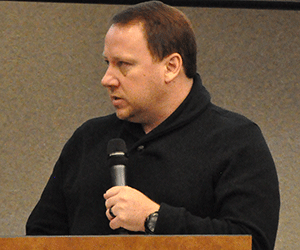On a night that was celebratory with the swearing in of elected members, Maricopa Unified School District Curriculum Director Wade Watson was grilled by the governing board.
It was nothing personal, but it was parental concern over the Beyond Textbooks curriculum map and uncertainty about aligning standards and assessments.
The program was implemented at MUSD during the 2013-14 school year in an effort to reach an A rating. It is a replication of an instruction program at the Vail Unified School District, long held as a model of school achievement.
Beyond Textbooks Formative Assessment does have its challenges, as Watson outlined in his presentation Wednesday night. Those include the number of assessments required.
Board members Torri Anderson and AnnaMarie Knorr expressed parents’ frustration at assessments not lining up with classroom studies and test results not being sent home.
Knorr said it was difficult for a parent to gauge where a child was academically without personally seeing the test. Watson said Beyond Textbooks is proprietary and has a “test security protocol” in place.
“It is hard not to be able to send it home,” he said. Parents can go over results with teachers at school.
Unlike last year, this school year the Beyond Textbook assessments follow the Arizona College and Career Readiness Standards of the state in math and reading. The district uses the Galileo instructional system.
Anderson said a quarter of the semester final had not been covered in classroom instruction. Watson said that was one of the concerns, and there would be improved communication with teachers.
Beyond Textbooks, which cost the district $43,000 this year, was another program for teachers to adapt to in the past year and it had a challenging pace, Watson said.
But teachers also have the opportunity to add to the resources.
***ADVERTISEMENT***“It’s great when our teachers have contributed to that program,” he said.
Beyond Textbooks allows teachers to evaluate a student’s progress in the short-term and the long-term, he said. The accuracy of the program will improve with the stability of state standards and assessments, Watson said.
Anderson requested he gather feedback from teachers to learn which assessment they prefer.




![Maricopa sheds tears amid Maui wildfires that killed dozens For Maricopa resident Janelle Gomez, the sorrow mirrors the loss of a family member. [Brian Petersheim]](https://www.inmaricopa.com/wp-content/uploads/2023/08/Gomez-218x150.jpg)
![Embracing Freedom: Celebrating the Fourth of July Councilmember Vincent Manfredi at Great American 4th 2021 [Victor Moreno]](https://www.inmaricopa.com/wp-content/uploads/2023/07/2021-Great-American-4th-e1688414543522-218x150.jpg)












![Elena Trails releases home renderings An image of one of 56 elevation renderings submitted to Maricopa's planning department for the Elena Trails subdivison. The developer plans to construct 14 different floor plans, with four elevation styles per plan. [City of Maricopa]](https://www.inmaricopa.com/wp-content/uploads/2024/04/city-041724-elena-trails-rendering-100x70.jpg)